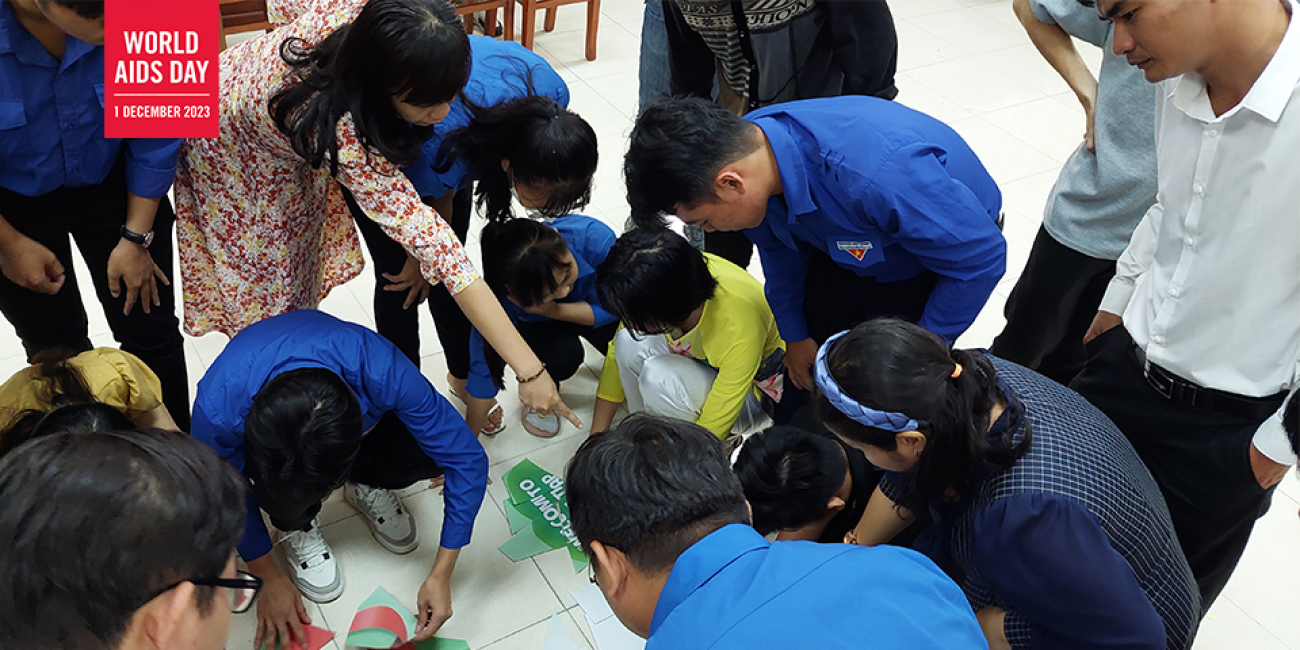“Part of my job is to do extra curriculum sessions on sexual and reproductive health at junior and secondary high schools.” Said Ms. Phan Thi Thu Trang, a worker at the reproductive health department of the central highland province of Lam Dong’s Centre for Disease Control (CDC). “But I and teachers were not able to help much with questions on LGBT[1] persons.”
“We were aware of cases of discrimination and even physical violence against boys who are seen as not masculine enough.” She continued. “All the teachers could do was impose disciplinary measures following the incidence. We haven’t been able to address the root cause of this discrimination and violence, which is the lack of knowledge on sexual orientation and gender identity and expression[2] among our young students.”
Ms. Trang is one participant at a provincial training workshop in Lam Dong province conducted by a group of community members coming from the Viet Nam Network of People Living with HIV (VNP+) and the Mekong Delta Network of Young Key Populations. The provincial information, education and communications (IEC) training focused on building knowledge and youth-targeted communication skills on comprehensive sexuality issues. The aim is to prevent HIV and gender-based violence (GBV) among youth.
The IEC training is an initiative of the community by community to fill the gap of comprehensive sexuality education in and out of school. The training workshop is technically supported by UNAIDS and UNFPA, and co-hosted by Ho Chi Minh City AIDS Association and provincial authorities working on health and youth issues, including provincial CDCs, the Youth Union and Department of Training and Education. In 2023, staff working directly with youth from relevant provincial authorities and in schools and colleges from the three provinces of An Giang, Dong Thap and Lam Dong received the first training. These three provinces were chosen because data shows that they have increasing HIV infections among young men who have sex with men (MSM).
“We know the linkage between SOGIE awareness on the one hand and HIV prevention awareness and uptake on the other hand. We also see the knowledge gap on this linkage in high schools and colleges. So in recent years we proactively approached some schools and colleges, first in Ho Chi Minh City and subsequently in adjacent provinces, where the need is high for IEC activities on these issues.” Said Dr. Nguyen Tan Thu one training facilitator for these training workshops, also a medical doctor who is member of VNP+ and of the LGBTIQ+ communities.
“It was very helpful that we were able to take reference of the latest UN guidance on CSE in and out of school to update and improve the training contents, thanks to technical support by UNAIDS and UNFPA.” Dr. Thu added.
The five-day training workshop was designed to be highly interactive and embracing learner-centred approach. The training participants got the opportunity to learn about and reflect upon SOGIE and CSE issues mainly through training facilitators who are young LGBTQI+ persons and through group work.
“This training was unconventional yet very interesting and eye opening, compared to all the training I attended previously. I did not expect that I would stay fully engaged throughout the entire 5-day training.” Said Mr. Hoang Van Ngung a high school teacher who is also in charge of Youth Union activities in his school in a rural district of Dong Thap province.
“I not only learned new knowledge, but also very importantly skills to develop and conduct an effective communication session for young people.” Said Ms. Trang of Lam Dong provincial CDC. “I got first-hand understanding of the LGBT community and now I am very sympathetic towards the community. The training allowed me to connect better with students. After one communication session I had conducted following this training, a male student voluntarily shared his experience of being stigmatized due to his specific gender orientation and expression.”
Post-training evaluation from the three workshops show that all training participants had positive feedback on both training contents and training methodology, with special appreciation for the opportunity to engage with representatives of the young key populations, including young gay men and transgender women who are providing HIV prevention services for their own communities.
“Community leadership is key for an effective HIV response. Communities know best the needs of their peers and how to reach them, enroll them in HIV services and provide follow-up support to keep them on HIV treatment for their good health but also for the virus not to transmit further.” Said Mr. Quinten Lataire, UNAIDS Country Director a.i.
“We need to provide more support for communities and an enabling environment for stronger community-led responses so Viet Nam can achieve its national goal of ending AIDS by 2030.” Added Mr. Lataire.
[1] LGBT persons include lesbian, gay, bi-sexual and transgender persons
[2] SOGIE is the abbreviation for sexual orientation, gender identity and expression





